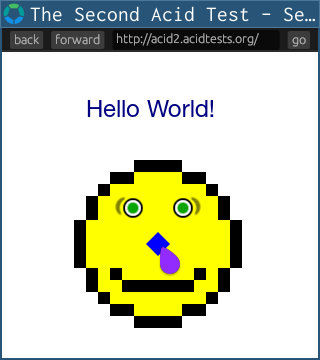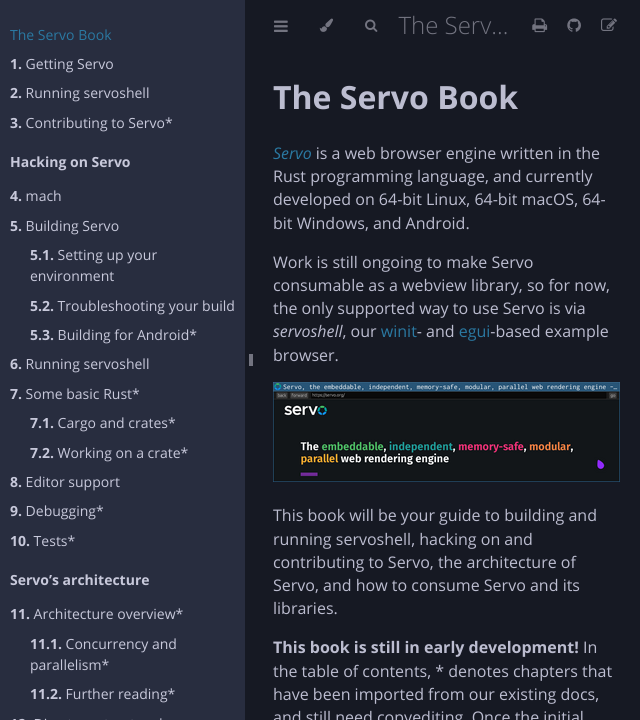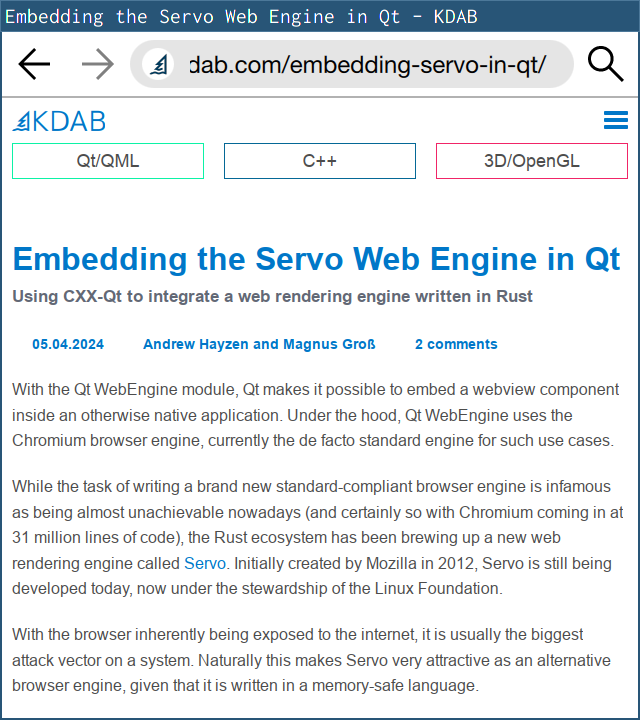
Back in November, Servo’s new layout engine passed Acid1, and this month, thanks to a bug-squashing sprint by @mrobinson and @Loirooriol, we now pass Acid2!
We would also like to thank you all for your generous support! Since we moved to Open Collective and GitHub Sponsors in March, we have received 1578 USD (after fees), including 1348 USD/month (before fees) in recurring donations. This smashed our first two goals, and is a respectable part of the way towards our next goal of 10000 USD/month. For more details, see our Sponsorship page and announcement post.
We are still receiving donations from 19 people on LFX, and we’re working on transferring the balance to our new fund, but we will stop accepting donations there soon — please move your recurring donations to GitHub or Open Collective. As always, use of these funds will be decided transparently in the Technical Steering Committee, starting with the TSC meeting on 29 April.

Servo’s docs are moving to the Servo book, and a very early version of this is now online (@delan, servo/book)! The goal is to unify our many sources of documentation, including the hacking quickstart guide, building Servo page, Servo design page, and other in-tree docs and wiki pages, into a book that’s richer and easier to search and navigate.
Servo now supports several new features in its nightly builds:
- as of 2024-04-02,
filessetter on HTMLInputElement (@shanehandley, #31934) - as of 2024-04-05, ‘ex’ units in CSS (@mrobinson, #31966)
- as of 2024-04-05,
onSubmittedWorkDonemethod on GPUQueue (@sagudev, #31772) - as of 2024-04-08,
deleteRow(-1)on empty HTMLTableElement (@shanehandley, #32009) - as of 2024-04-12, ElementInternals and attachInternals (@pshaughn, @cathiechen, #25705, #31980)
- as of 2024-04-16, ‘background-attachment: fixed’ (@mrobinson, #32068)
- as of 2024-04-16, <object> with image data URLs (@mrobinson, #32069)
- as of 2024-04-18, ‘clear’ property on <br> elements (@mrobinson, #32094)
- as of 2024-04-23, basic support for ‘list-style-position: outside’ (@mrobinson, @Loirooriol, #32114)
As of 2024-04-05, we now support non-autoplay <video> (@eerii, media#419, #32001), as long as the page provides its own controls, as well as the ‘baseline-source’ property (@MunishMummadi, #31904, #31913). Both of these contributors started out as Outreachy participants, and we’re thrilled to see their continued work on improving Servo.
We’ve also landed several other rendering improvements:
- Stylo is now fully caught up with upstream (@Loirooriol, #31932, #31991, #32032, #32066, #32089, #32128)
- elements or frames no longer scroll to top when transforms change (@mrobinson, #31892)
- fixed intrinsic sizing of inline content containing ‘pre-wrap’ (@Loirooriol, #31930)
- fixed margin collapsing with indefinite percentages or non-zero height (@Loirooriol, #32059, #32060)
- fixed some (but not all) HTTP 400 errors when sending requests to nginx (@philip-lamb, #32024, #32093)
- fixed ‘min-height’ and ‘max-height’ on elements with ‘float’ (@Loirooriol, #32057)
Our font rendering has improved, with support for selecting the correct weight and style in indexed fonts (.ttc) on Linux (@mukilan, @mrobinson, #32127), as well as support for emoji font fallback on macOS (@mrobinson, #32122). Note that color emoji are not yet supported.
Other big changes are coming to Servo’s font loading and rendering, thanks to @mrobinson’s font system redesign RFC (#32033). Work has already started on this (@mrobinson, @mukilan, #32034, #32038, #32100, #32101, #32115), with the eventual goal of making font data zero-copy readable from multiple threads. This in turn will fix several major issues with font caching, including cached font data leaking over time and between pages, unnecessary loading from disk, and unnecessary copying to layout.
We’ve also started simplifying the script–layout interface (@mrobinson, #31937, #32081), since layout was merged into the script thread, and script can now call into layout without IPC.
Embedding and dev changes

A prototype for integrating Servo with Qt was built by @ahayzen-kdab and @vimpostor and shown at Embedded World 2024. We’re looking forward to incorporating their feedback from this to improve Servo’s embedding API. For more details, check out their GitHub repo and Embedding the Servo Web Engine in Qt.
Servo now supports multiple concurrent webviews (@wusyong, @delan, @atbrakhi, #31417, #32067)! This is a big step towards making Servo a viable embedded webview, and we will soon use it to implement tabbed browsing in servoshell (@delan, #31545).
Three of the slowest crates in the Servo build process are mozjs_sys, mozangle, and script. The first two compile some very large C++ libraries in their build scripts — SpiderMonkey and ANGLE respectively — and the third blocks on the first two. They can account for over two minutes of build time, even on a very fast machine (AMD 7950X), and a breaking change in newer versions of GNU Make (mozjs#375) can make mozjs_sys take over eight minutes to build!
mozjs_sys now uses a prebuilt version of SpiderMonkey by default (@wusyong, @sagudev, mozjs#450, #31824), cutting clean build times by over seven minutes on a very fast machine (see above). On Linux with Nix (the package manager), where we run an unaffected version of GNU Make, it can still save over 100 seconds on a quad-core CPU with SMT. Further savings will be possible once we do the same for mozangle.
If you use NixOS, or any Linux distro with Nix, you can now get a shell with all of the tools and dependencies needed to build and run Servo by typing nix-shell (@delan, #32035), without also needing to type etc/shell.nix.
As for CI, our experimental Android build now supports aarch64 (@mukilan, #32137), in addition to Android on armv7, x86_64, and i686, and we’ve improved flakiness in the WebGPU tests (@sagudev, #31952) and macOS builds (@mrobinson, #32005).
Conferences and events
Earlier this month, Rakhi Sharma gave her talk A year of Servo reboot: where are we now? at Open Source Summit North America (slides; recording available soon) and at the Seattle Rust User Group (slides).
In the Netherlands, Gregory Terzian will be presenting Modular Servo: Three Paths Forward at the GOSIM Conference 2024, on 6 May at 15:10 local time (13:10 UTC). That’s the same venue as RustNL 2024, just one day earlier, and you can also find Gregory, Rakhi, and Nico at RustNL afterwards. See you there!